Hexagramme 29 du Yi Jing - Trait 1
L'hexagramme : 29
Un hexagramme est une combinaison de six traits yin et yang.
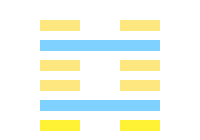
29.1 (29 > 60) - THE KHAN HEXAGRAM.
The first line, divided, shows its subject in the double defile, and (yet) entering a cavern within it. There will be evil.
Bing DeepL Google Yandex29.1 (29 > 60) - Dealing with problems in the right order
When one has encountered a difficulty, one must solve it before facing others.
Bing DeepL Google Yandex29.1 (29 > 60) - Dealing with problems in the right order
When one has encountered a difficulty, one must solve it before facing others.
Bing DeepL Google Yandex29.1 (29 > 60) - K’ân, l’abîme
K’ān : danger, précipice, caverne. — Tsa k’ān : courir de grands risques ; s’exposer au danger pour un autre.
Courir des dangers, comme entrer dans une caverne d’un défilé dangereux, est chose redoutable.
Bing DeepL Google Yandex29.1 (29 > 60) - Traiter les problèmes dans l'ordre
Quand on a rencontré une difficulté, on doit la résoudre avant d'en affronter d'autres.
Bing DeepL Google Yandex29.1 (29 > 60) - Mélység
Ha egy nehézséggel találkozott, meg kell oldania mielőtt elkezdene foglalkozni egy másikkal.
Bing DeepL Google YandexLes trigrammes
Les trigrammes sont des combinaisons de trois traits yin et yang. Dans l'hexagramme, les trois traits du dessous constituent le trigramme inférieur et représentent la situation intérieure. Les trois lignes du haut constituent le trigramme supérieur et représentent la situation extérieure.
trigSup

Trigramme inférieur : L'eau Le lac


L'hexagramme nucléaire : 27
L'hexagramme nucléaire est l'association des deux trigrammes intérieurs (traits 2,3,4 et 3,4,5). Il représente la racine, ou l'origine de la situation.

27 - THE Î HEXAGRAM.
Î indicates that with firm correctness there will be good fortune (in what is denoted by it). We must look at what we are seeking to nourish, and by the exercise of our thoughts seek for the proper aliment.
Bing DeepL Google Yandex27 - I, l’alimentation
Ī : 1. Entretenir, soutenir ; 2. Menton, côté de la bouche ; 3. Profond.
Texte
Entretenir : achève heureusement. (Il faut) examiner soigneusement comment on entretient. On doit chercher soi-même ce qui est bon pour sa bouche.
Symbolisme
Une montagne au-dessus du tonnerre (image de celui qui réprime ses désirs, restreint ses tendances). Le sage s’observe ainsi en ses paroles et modère l’usage des aliments.
Commentaire
Entretenir sa rectitude est cause de bonheur. On doit examiner ce que l’on entretient et ce qui doit nous entretenir. Le ciel et la terre entretiennent tout ; le saint entretient la sagesse pour atteindre par eux tous les peuples. Grande est l’opportunité de l’entretien.
Le dérivé (Fan Yao) : 60.1
Le même trait sur l'hexagramme après la mutation. Il représente ce qui peut être fait APRÈS pour corriger la situation décrite par ce trait, un peu comme un remède ou une solution.

60.1 (60 > 29) - THE KIEH HEXAGRAM.
The first line, undivided, shows its subject not quitting the courtyard outside his door. There will be no error.
Bing DeepL Google Yandex60.1 (60 > 29) - Calming one' s joy
One stops tiring oneself while waiting for one's friends to return.
Bing DeepL Google Yandex60.1 (60 > 29) - Calming one' s joy
One stops tiring oneself while waiting for one's friends to return.
Bing DeepL Google Yandex60.1 (60 > 29) - Tsieh, la délimitation
Tsieh : règle, loi, mesure.
Tel ne sort pas de la porte extérieure de son habitation et n’en a point de regret.
(Dès qu’il voit tout ce qui se passe chez lui, il peut tout y bien gouverner.) Quand on sait qu’il y a lieu de ne pas sortir ou bien empêchement.
60.1 (60 > 29) - Calmer sa joie
On arrête de se fatiguer en attendant que ses amis reviennent.
Bing DeepL Google Yandex60.1 (60 > 29) - Korlátozás
Nem gyötri saját magát tovább miközben várja hogy visszatérjenek a barátai.
Bing DeepL Google YandexLa jointure: 59.6
Le dérivé du réciproque. Il représente ce qui aurait pu être fait AVANT pour prévenir la situation décrite par ce trait, un peu comme un remède ou une solution.

59.6 (59 > 29) - THE HWÂN HEXAGRAM.
The topmost line, undivided, shows its subject disposing of (what may be called) its bloody wounds, and going and separating himself from its anxious fears. There will be no error.
Bing DeepL Google Yandex59.6 (59 > 29) - Losing confidence
When one does not know if one can repair, one moves away and renounces to ask the most capable for the means to continue.
Bing DeepL Google Yandex59.6 (59 > 29) - Losing confidence
When one does not know if one can repair, one moves away and renounces to ask the most capable for the means to continue.
Bing DeepL Google Yandex59.6 (59 > 29) - Hwán, la dissolution
Hwán : extension, exposition, développement, abondance débordante ; dispersion, dissipation.
Répandre (hwán) son sang pour repousser des envahisseurs et se mettre en avant pour cela, sans regret. (C’est ce qu’il faut faire.)
Répandre son sang pour éloigner les malheurs.
59.6 (59 > 29) - Perdre son assurance
Quand on ne sait pas si on peut réparer, on s'éloigne et on renonce à demander aux plus capables des moyens pour continuer.
Bing DeepL Google Yandex59.6 (59 > 29) - Elválasztás
Ha valaki nem tudja hogyan javítsa meg, menjen és igényeiről lemondva kérje meg a legrátermettebbet a folytatásra.
Bing DeepL Google YandexLe réciproque : 29.6
L'hexagramme renversé. Il représente la situation opposée, et en tant que tel est essentiel pour la validation des commentaires.
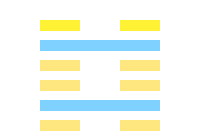
29.6 (29 > 59) - THE KHAN HEXAGRAM.
The topmost line, divided, shows its subject bound with cords of three strands or two strands, and placed in the thicket of thorns. But in three years he does not learn the course for him to pursue. There will be evil.
Bing DeepL Google Yandex29.6 (29 > 59) - Pausing
When it is too tiring, one can stop and resume later.
Bing DeepL Google Yandex29.6 (29 > 59) - Pausing
When it is too tiring, one can stop and resume later.
Bing DeepL Google Yandex29.6 (29 > 59) - K’ân, l’abîme
K’ān : danger, précipice, caverne. — Tsa k’ān : courir de grands risques ; s’exposer au danger pour un autre.
Danger de celui qui, lié, vinculé de triples liens, enfermé dans un cachot, ne peut de longtemps parvenir à se délivrer. Sort funeste ! — Tel est celui qui a perdu la voie de la sagesse
Bing DeepL Google Yandex29.6 (29 > 59) - Mettre en pause
Quand c'est trop fatiguant, on peut s'arrêter et reprendre plus tard.
Bing DeepL Google Yandex29.6 (29 > 59) - Mélység
Ha túl fáradt, meg kell állnia és később folytatnia.
Bing DeepL Google YandexMutations

29.1 (29 > 60) - THE KHAN HEXAGRAM.
The first line, divided, shows its subject in the double defile, and (yet) entering a cavern within it. There will be evil.
Bing DeepL Google Yandex29.1 (29 > 60) - Dealing with problems in the right order
When one has encountered a difficulty, one must solve it before facing others.
Bing DeepL Google Yandex29.1 (29 > 60) - Dealing with problems in the right order
When one has encountered a difficulty, one must solve it before facing others.
Bing DeepL Google Yandex29.1 (29 > 60) - K’ân, l’abîme
K’ān : danger, précipice, caverne. — Tsa k’ān : courir de grands risques ; s’exposer au danger pour un autre.
Courir des dangers, comme entrer dans une caverne d’un défilé dangereux, est chose redoutable.
Bing DeepL Google Yandex29.1 (29 > 60) - Traiter les problèmes dans l'ordre
Quand on a rencontré une difficulté, on doit la résoudre avant d'en affronter d'autres.
Bing DeepL Google Yandex29.1 (29 > 60) - Mélység
Ha egy nehézséggel találkozott, meg kell oldania mielőtt elkezdene foglalkozni egy másikkal.
Bing DeepL Google Yandex
29.1.2 (29 > 3) - THE KHAN HEXAGRAM.
- 1. The first line, divided, shows its subject in the double defile, and (yet) entering a cavern within it. There will be evil.
- 2. The second line, undivided, shows its subject in all the peril of the defile. He will, however, get a little (of the deliverance) that he seeks.
29.1.2 (29 > 3) - Getting away with a pirouette
One thinks having made a blunder even though the others didn't notice anything.
Bing DeepL Google Yandex29.1.2 (29 > 3) - Getting away with a pirouette
One thinks having made a blunder even though the others didn't notice anything.
Bing DeepL Google Yandex29.1.2 (29 > 3) - K’ân, l’abîme
K’ān : danger, précipice, caverne. — Tsa k’ān : courir de grands risques ; s’exposer au danger pour un autre.
- 1. Courir des dangers, comme entrer dans une caverne d’un défilé dangereux, est chose redoutable.
-
2. Dans les écueils périlleux, si on sait modérer ses sentiments, on pourra en sortir heureusement.
Si on garde la modération.
29.1.2 (29 > 3) - S'en sortir avec une pirouette
On pense avoir commis une gaffe bien que les autres n'aient rien remarqué.
Bing DeepL Google Yandex29.1.2 (29 > 3) - Mélység
- 1. Ha egy nehézséggel találkozott, meg kell oldania mielőtt elkezdene foglalkozni egy másikkal.
- 2. Ha valaki túl nagy nehézségekkel kerül szembe, rá kell hagynia olyanokra akik tudják kezelni azokat.
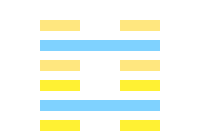
29.1.3 (29 > 5) - THE KHAN HEXAGRAM.
- 1. The first line, divided, shows its subject in the double defile, and (yet) entering a cavern within it. There will be evil.
- 3. The third line, divided, shows its subject, whether he comes or goes ( = descends or ascends), confronted by a defile. All is peril to him and unrest. (His endeavours) will lead him into the cavern of the pit. There should be no action (in such a case).
29.1.3 (29 > 5) - Repeating the demonstration
One presents facts that others have already experienced.
Bing DeepL Google Yandex29.1.3 (29 > 5) - Repeating the demonstration
One presents facts that others have already experienced.
Bing DeepL Google Yandex29.1.3 (29 > 5) - K’ân, l’abîme
K’ān : danger, précipice, caverne. — Tsa k’ān : courir de grands risques ; s’exposer au danger pour un autre.
- 1. Courir des dangers, comme entrer dans une caverne d’un défilé dangereux, est chose redoutable.
- 3. Si en tout et partout on ne rencontre que danger, que les périls, les sujets de crainte s’accumulent, alors dans un tel danger, il n’y a plus d’expédient qui puisse servir. — Il n’y aura plus de secours possible.
29.1.3 (29 > 5) - Refaire la démonstration
On présente des faits que les autres ont déjà expérimentés.
Bing DeepL Google Yandex29.1.3 (29 > 5) - Mélység
- 1. Ha egy nehézséggel találkozott, meg kell oldania mielőtt elkezdene foglalkozni egy másikkal.
- 3. Látják amit elrontott így odébbáll.

29.1.2.3 (29 > 63) - THE KHAN HEXAGRAM.
- 1. The first line, divided, shows its subject in the double defile, and (yet) entering a cavern within it. There will be evil.
- 2. The second line, undivided, shows its subject in all the peril of the defile. He will, however, get a little (of the deliverance) that he seeks.
- 3. The third line, divided, shows its subject, whether he comes or goes ( = descends or ascends), confronted by a defile. All is peril to him and unrest. (His endeavours) will lead him into the cavern of the pit. There should be no action (in such a case).
29.1.2.3 (29 > 63) - Being governed by anger
One crystallizes one's rejections after having been the victim of an attack that one had feared.
Bing DeepL Google Yandex29.1.2.3 (29 > 63) - Being governed by anger
One crystallizes one's rejections after having been the victim of an attack that one had feared.
Bing DeepL Google Yandex29.1.2.3 (29 > 63) - K’ân, l’abîme
K’ān : danger, précipice, caverne. — Tsa k’ān : courir de grands risques ; s’exposer au danger pour un autre.
- 1. Courir des dangers, comme entrer dans une caverne d’un défilé dangereux, est chose redoutable.
-
2. Dans les écueils périlleux, si on sait modérer ses sentiments, on pourra en sortir heureusement.
Si on garde la modération. - 3. Si en tout et partout on ne rencontre que danger, que les périls, les sujets de crainte s’accumulent, alors dans un tel danger, il n’y a plus d’expédient qui puisse servir. — Il n’y aura plus de secours possible.
29.1.2.3 (29 > 63) - Être gouverné par la colère
On cristallise ses rejets après avoir été la victime d'une attaque que l'on avait redoutée.
Bing DeepL Google Yandex29.1.2.3 (29 > 63) - Mélység
- 1. Ha egy nehézséggel találkozott, meg kell oldania mielőtt elkezdene foglalkozni egy másikkal.
- 2. Ha valaki túl nagy nehézségekkel kerül szembe, rá kell hagynia olyanokra akik tudják kezelni azokat.
- 3. Látják amit elrontott így odébbáll.
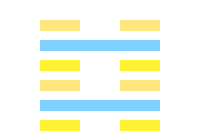
29.1.4 (29 > 58) - THE KHAN HEXAGRAM.
- 1. The first line, divided, shows its subject in the double defile, and (yet) entering a cavern within it. There will be evil.
- 4. The fourth line, divided, shows its subject (at a feast), with (simply) a bottle of spirits, and a subsidiary basket of rice, while (the cups and bowls) are (only) of earthenware. He introduces his important lessons (as his ruler's) intelligence admits. There will in the end be no error.
29.1.4 (29 > 58) - Reconnecting with one's old demons
One goes to the meeting despite the firm opposition of others.
Bing DeepL Google Yandex29.1.4 (29 > 58) - Reconnecting with one's old demons
One goes to the meeting despite the firm opposition of others.
Bing DeepL Google Yandex29.1.4 (29 > 58) - K’ân, l’abîme
K’ān : danger, précipice, caverne. — Tsa k’ān : courir de grands risques ; s’exposer au danger pour un autre.
- 1. Courir des dangers, comme entrer dans une caverne d’un défilé dangereux, est chose redoutable.
- 4. Si l’on offre des sacrifices avec simplicité (sans ostentation), avec un vase de spiritueux et une corbeille de grains, tandis que les assistants n’ont que des vases de terre, si par cette modération on se forme à la vertu, alors qu’on aurait d’abord des difficultés et des écueils, on deviendra irréprochable. (Moyen d’éviter les dangers.)
29.1.4 (29 > 58) - Renouer avec ses vieux démons
On se revoit bien que les autres s'y opposent fermement.
Bing DeepL Google Yandex29.1.4 (29 > 58) - Mélység
- 1. Ha egy nehézséggel találkozott, meg kell oldania mielőtt elkezdene foglalkozni egy másikkal.
- 4. Ha valaki eszközök híján van, meg kell elégednie egyszerű dolgokkal.

29.1.2.4 (29 > 17) - THE KHAN HEXAGRAM.
- 1. The first line, divided, shows its subject in the double defile, and (yet) entering a cavern within it. There will be evil.
- 2. The second line, undivided, shows its subject in all the peril of the defile. He will, however, get a little (of the deliverance) that he seeks.
- 4. The fourth line, divided, shows its subject (at a feast), with (simply) a bottle of spirits, and a subsidiary basket of rice, while (the cups and bowls) are (only) of earthenware. He introduces his important lessons (as his ruler's) intelligence admits. There will in the end be no error.
29.1.2.4 (29 > 17) - Not making too many concessions
One refuses to let others take command of operations.
Bing DeepL Google Yandex29.1.2.4 (29 > 17) - Not making too many concessions
One refuses to let others take command of operations.
Bing DeepL Google Yandex29.1.2.4 (29 > 17) - K’ân, l’abîme
K’ān : danger, précipice, caverne. — Tsa k’ān : courir de grands risques ; s’exposer au danger pour un autre.
- 1. Courir des dangers, comme entrer dans une caverne d’un défilé dangereux, est chose redoutable.
-
2. Dans les écueils périlleux, si on sait modérer ses sentiments, on pourra en sortir heureusement.
Si on garde la modération. - 4. Si l’on offre des sacrifices avec simplicité (sans ostentation), avec un vase de spiritueux et une corbeille de grains, tandis que les assistants n’ont que des vases de terre, si par cette modération on se forme à la vertu, alors qu’on aurait d’abord des difficultés et des écueils, on deviendra irréprochable. (Moyen d’éviter les dangers.)
29.1.2.4 (29 > 17) - Ne pas trop faire de concessions
On refuse de laisser les autres prendre le commandement des opérations.
Bing DeepL Google Yandex29.1.2.4 (29 > 17) - Mélység
- 1. Ha egy nehézséggel találkozott, meg kell oldania mielőtt elkezdene foglalkozni egy másikkal.
- 2. Ha valaki túl nagy nehézségekkel kerül szembe, rá kell hagynia olyanokra akik tudják kezelni azokat.
- 4. Ha valaki eszközök híján van, meg kell elégednie egyszerű dolgokkal.
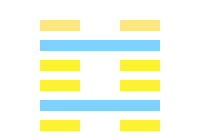
29.1.3.4 (29 > 43) - THE KHAN HEXAGRAM.
- 1. The first line, divided, shows its subject in the double defile, and (yet) entering a cavern within it. There will be evil.
- 3. The third line, divided, shows its subject, whether he comes or goes ( = descends or ascends), confronted by a defile. All is peril to him and unrest. (His endeavours) will lead him into the cavern of the pit. There should be no action (in such a case).
- 4. The fourth line, divided, shows its subject (at a feast), with (simply) a bottle of spirits, and a subsidiary basket of rice, while (the cups and bowls) are (only) of earthenware. He introduces his important lessons (as his ruler's) intelligence admits. There will in the end be no error.
29.1.3.4 (29 > 43) - Defiling one's environment
One finds an interest in making sordid jokes.
Bing DeepL Google Yandex29.1.3.4 (29 > 43) - Defiling one's environment
One finds an interest in making sordid jokes.
Bing DeepL Google Yandex29.1.3.4 (29 > 43) - K’ân, l’abîme
K’ān : danger, précipice, caverne. — Tsa k’ān : courir de grands risques ; s’exposer au danger pour un autre.
- 1. Courir des dangers, comme entrer dans une caverne d’un défilé dangereux, est chose redoutable.
- 3. Si en tout et partout on ne rencontre que danger, que les périls, les sujets de crainte s’accumulent, alors dans un tel danger, il n’y a plus d’expédient qui puisse servir. — Il n’y aura plus de secours possible.
- 4. Si l’on offre des sacrifices avec simplicité (sans ostentation), avec un vase de spiritueux et une corbeille de grains, tandis que les assistants n’ont que des vases de terre, si par cette modération on se forme à la vertu, alors qu’on aurait d’abord des difficultés et des écueils, on deviendra irréprochable. (Moyen d’éviter les dangers.)
29.1.3.4 (29 > 43) - Souiller son environnement
On trouve un intérêt à faire des blagues sordides.
Bing DeepL Google Yandex29.1.3.4 (29 > 43) - Mélység
- 1. Ha egy nehézséggel találkozott, meg kell oldania mielőtt elkezdene foglalkozni egy másikkal.
- 3. Látják amit elrontott így odébbáll.
- 4. Ha valaki eszközök híján van, meg kell elégednie egyszerű dolgokkal.

29.1.2.3.4 (29 > 49) - THE KHAN HEXAGRAM.
- 1. The first line, divided, shows its subject in the double defile, and (yet) entering a cavern within it. There will be evil.
- 2. The second line, undivided, shows its subject in all the peril of the defile. He will, however, get a little (of the deliverance) that he seeks.
- 3. The third line, divided, shows its subject, whether he comes or goes ( = descends or ascends), confronted by a defile. All is peril to him and unrest. (His endeavours) will lead him into the cavern of the pit. There should be no action (in such a case).
- 4. The fourth line, divided, shows its subject (at a feast), with (simply) a bottle of spirits, and a subsidiary basket of rice, while (the cups and bowls) are (only) of earthenware. He introduces his important lessons (as his ruler's) intelligence admits. There will in the end be no error.
29.1.2.3.4 (29 > 49) - Committing the forbidden
One gets busy on a project that others condemn.
Bing DeepL Google Yandex29.1.2.3.4 (29 > 49) - Committing the forbidden
One gets busy on a project that others condemn.
Bing DeepL Google Yandex29.1.2.3.4 (29 > 49) - K’ân, l’abîme
K’ān : danger, précipice, caverne. — Tsa k’ān : courir de grands risques ; s’exposer au danger pour un autre.
- 1. Courir des dangers, comme entrer dans une caverne d’un défilé dangereux, est chose redoutable.
-
2. Dans les écueils périlleux, si on sait modérer ses sentiments, on pourra en sortir heureusement.
Si on garde la modération. - 3. Si en tout et partout on ne rencontre que danger, que les périls, les sujets de crainte s’accumulent, alors dans un tel danger, il n’y a plus d’expédient qui puisse servir. — Il n’y aura plus de secours possible.
- 4. Si l’on offre des sacrifices avec simplicité (sans ostentation), avec un vase de spiritueux et une corbeille de grains, tandis que les assistants n’ont que des vases de terre, si par cette modération on se forme à la vertu, alors qu’on aurait d’abord des difficultés et des écueils, on deviendra irréprochable. (Moyen d’éviter les dangers.)
29.1.2.3.4 (29 > 49) - Braver les interdits
On s'affaire autour d'un projet que les autres condamnent.
Bing DeepL Google Yandex29.1.2.3.4 (29 > 49) - Mélység
- 1. Ha egy nehézséggel találkozott, meg kell oldania mielőtt elkezdene foglalkozni egy másikkal.
- 2. Ha valaki túl nagy nehézségekkel kerül szembe, rá kell hagynia olyanokra akik tudják kezelni azokat.
- 3. Látják amit elrontott így odébbáll.
- 4. Ha valaki eszközök híján van, meg kell elégednie egyszerű dolgokkal.

29.1.5 (29 > 19) - THE KHAN HEXAGRAM.
- 1. The first line, divided, shows its subject in the double defile, and (yet) entering a cavern within it. There will be evil.
- 5. The fifth line, undivided, shows the water of the defile not yet full, (so that it might flow away) ; but order will (soon) be brought about. There will be no error.
29.1.5 (29 > 19) - Preferring work over leisure
One favours efforts at the expense of boldness and creativity.
Bing DeepL Google Yandex29.1.5 (29 > 19) - Preferring work over leisure
One favors efforts at the expense of boldness and creativity.
Bing DeepL Google Yandex29.1.5 (29 > 19) - K’ân, l’abîme
K’ān : danger, précipice, caverne. — Tsa k’ān : courir de grands risques ; s’exposer au danger pour un autre.
- 1. Courir des dangers, comme entrer dans une caverne d’un défilé dangereux, est chose redoutable.
- 5. Mais si le danger n’est pas inéluctable, si une caverne où l’on se trouve n’est point pleine d’eau et qu’on puisse encore aplanir le terrain, on en sortira sans faute. — Il n’arrivera pas malheur.
29.1.5 (29 > 19) - Préférer le travail aux loisirs
On privilégie les efforts au détriment de l'audace et de la créativité.
Bing DeepL Google Yandex29.1.5 (29 > 19) - Mélység
- 1. Ha egy nehézséggel találkozott, meg kell oldania mielőtt elkezdene foglalkozni egy másikkal.
- 5. Mielőtt visszatérne hogy segítsen másokon, szünetet kell tartania és fel kell készülnie hogy válaszoljon a közelállóknak.
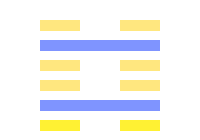
29.1.2.5 (29 > 24) - THE KHAN HEXAGRAM.
- 1. The first line, divided, shows its subject in the double defile, and (yet) entering a cavern within it. There will be evil.
- 2. The second line, undivided, shows its subject in all the peril of the defile. He will, however, get a little (of the deliverance) that he seeks.
- 5. The fifth line, undivided, shows the water of the defile not yet full, (so that it might flow away) ; but order will (soon) be brought about. There will be no error.
29.1.2.5 (29 > 24) - Ducking one's responsibilities
One takes refuge behind those one must defend.
Bing DeepL Google Yandex29.1.2.5 (29 > 24) - Ducking one's responsibilities
One takes refuge behind those one must defend.
Bing DeepL Google Yandex29.1.2.5 (29 > 24) - K’ân, l’abîme
K’ān : danger, précipice, caverne. — Tsa k’ān : courir de grands risques ; s’exposer au danger pour un autre.
- 1. Courir des dangers, comme entrer dans une caverne d’un défilé dangereux, est chose redoutable.
-
2. Dans les écueils périlleux, si on sait modérer ses sentiments, on pourra en sortir heureusement.
Si on garde la modération. - 5. Mais si le danger n’est pas inéluctable, si une caverne où l’on se trouve n’est point pleine d’eau et qu’on puisse encore aplanir le terrain, on en sortira sans faute. — Il n’arrivera pas malheur.
29.1.2.5 (29 > 24) - Fuir ses responsabilités
On se réfugie derrière ceux que l'on doit défendre.
Bing DeepL Google Yandex29.1.2.5 (29 > 24) - Mélység
- 1. Ha egy nehézséggel találkozott, meg kell oldania mielőtt elkezdene foglalkozni egy másikkal.
- 2. Ha valaki túl nagy nehézségekkel kerül szembe, rá kell hagynia olyanokra akik tudják kezelni azokat.
- 5. Mielőtt visszatérne hogy segítsen másokon, szünetet kell tartania és fel kell készülnie hogy válaszoljon a közelállóknak.

29.1.3.5 (29 > 11) - THE KHAN HEXAGRAM.
- 1. The first line, divided, shows its subject in the double defile, and (yet) entering a cavern within it. There will be evil.
- 3. The third line, divided, shows its subject, whether he comes or goes ( = descends or ascends), confronted by a defile. All is peril to him and unrest. (His endeavours) will lead him into the cavern of the pit. There should be no action (in such a case).
- 5. The fifth line, undivided, shows the water of the defile not yet full, (so that it might flow away) ; but order will (soon) be brought about. There will be no error.
29.1.3.5 (29 > 11) - Making false accusations
One accuses one's relatives of wrongdoing they could not commit.
Bing DeepL Google Yandex29.1.3.5 (29 > 11) - Making false accusations
One accuses one's relatives of wrongdoing they could not commit.
Bing DeepL Google Yandex29.1.3.5 (29 > 11) - K’ân, l’abîme
K’ān : danger, précipice, caverne. — Tsa k’ān : courir de grands risques ; s’exposer au danger pour un autre.
- 1. Courir des dangers, comme entrer dans une caverne d’un défilé dangereux, est chose redoutable.
- 3. Si en tout et partout on ne rencontre que danger, que les périls, les sujets de crainte s’accumulent, alors dans un tel danger, il n’y a plus d’expédient qui puisse servir. — Il n’y aura plus de secours possible.
- 5. Mais si le danger n’est pas inéluctable, si une caverne où l’on se trouve n’est point pleine d’eau et qu’on puisse encore aplanir le terrain, on en sortira sans faute. — Il n’arrivera pas malheur.
29.1.3.5 (29 > 11) - Lancer de fausses accusations
On accuse ses proches de méfaits qu'ils n'ont pas pu commettre.
Bing DeepL Google Yandex29.1.3.5 (29 > 11) - Mélység
- 1. Ha egy nehézséggel találkozott, meg kell oldania mielőtt elkezdene foglalkozni egy másikkal.
- 3. Látják amit elrontott így odébbáll.
- 5. Mielőtt visszatérne hogy segítsen másokon, szünetet kell tartania és fel kell készülnie hogy válaszoljon a közelállóknak.
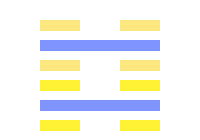
29.1.2.3.5 (29 > 36) - THE KHAN HEXAGRAM.
- 1. The first line, divided, shows its subject in the double defile, and (yet) entering a cavern within it. There will be evil.
- 2. The second line, undivided, shows its subject in all the peril of the defile. He will, however, get a little (of the deliverance) that he seeks.
- 3. The third line, divided, shows its subject, whether he comes or goes ( = descends or ascends), confronted by a defile. All is peril to him and unrest. (His endeavours) will lead him into the cavern of the pit. There should be no action (in such a case).
- 5. The fifth line, undivided, shows the water of the defile not yet full, (so that it might flow away) ; but order will (soon) be brought about. There will be no error.
29.1.2.3.5 (29 > 36) - Staying in one's inner circle
One often goes to see one's friends to have a good time with them.
Bing DeepL Google Yandex29.1.2.3.5 (29 > 36) - Staying in one's inner circle
One often goes to see one's friends to have a good time with them.
Bing DeepL Google Yandex29.1.2.3.5 (29 > 36) - K’ân, l’abîme
K’ān : danger, précipice, caverne. — Tsa k’ān : courir de grands risques ; s’exposer au danger pour un autre.
- 1. Courir des dangers, comme entrer dans une caverne d’un défilé dangereux, est chose redoutable.
-
2. Dans les écueils périlleux, si on sait modérer ses sentiments, on pourra en sortir heureusement.
Si on garde la modération. - 3. Si en tout et partout on ne rencontre que danger, que les périls, les sujets de crainte s’accumulent, alors dans un tel danger, il n’y a plus d’expédient qui puisse servir. — Il n’y aura plus de secours possible.
- 5. Mais si le danger n’est pas inéluctable, si une caverne où l’on se trouve n’est point pleine d’eau et qu’on puisse encore aplanir le terrain, on en sortira sans faute. — Il n’arrivera pas malheur.
29.1.2.3.5 (29 > 36) - Rester dans son cercle intime
On va souvent voir ses amis pour passer du bon temps avec eux.
Bing DeepL Google Yandex29.1.2.3.5 (29 > 36) - Mélység
- 1. Ha egy nehézséggel találkozott, meg kell oldania mielőtt elkezdene foglalkozni egy másikkal.
- 2. Ha valaki túl nagy nehézségekkel kerül szembe, rá kell hagynia olyanokra akik tudják kezelni azokat.
- 3. Látják amit elrontott így odébbáll.
- 5. Mielőtt visszatérne hogy segítsen másokon, szünetet kell tartania és fel kell készülnie hogy válaszoljon a közelállóknak.

29.1.4.5 (29 > 54) - THE KHAN HEXAGRAM.
- 1. The first line, divided, shows its subject in the double defile, and (yet) entering a cavern within it. There will be evil.
- 4. The fourth line, divided, shows its subject (at a feast), with (simply) a bottle of spirits, and a subsidiary basket of rice, while (the cups and bowls) are (only) of earthenware. He introduces his important lessons (as his ruler's) intelligence admits. There will in the end be no error.
- 5. The fifth line, undivided, shows the water of the defile not yet full, (so that it might flow away) ; but order will (soon) be brought about. There will be no error.
29.1.4.5 (29 > 54) - Being gullible
One calculates one's interest without first checking what others are saying.
Bing DeepL Google Yandex29.1.4.5 (29 > 54) - Being gullible
One calculates one's interest without first checking what others are saying.
Bing DeepL Google Yandex29.1.4.5 (29 > 54) - K’ân, l’abîme
K’ān : danger, précipice, caverne. — Tsa k’ān : courir de grands risques ; s’exposer au danger pour un autre.
- 1. Courir des dangers, comme entrer dans une caverne d’un défilé dangereux, est chose redoutable.
- 4. Si l’on offre des sacrifices avec simplicité (sans ostentation), avec un vase de spiritueux et une corbeille de grains, tandis que les assistants n’ont que des vases de terre, si par cette modération on se forme à la vertu, alors qu’on aurait d’abord des difficultés et des écueils, on deviendra irréprochable. (Moyen d’éviter les dangers.)
- 5. Mais si le danger n’est pas inéluctable, si une caverne où l’on se trouve n’est point pleine d’eau et qu’on puisse encore aplanir le terrain, on en sortira sans faute. — Il n’arrivera pas malheur.
29.1.4.5 (29 > 54) - Être crédule
On calcule ses intérêts sans avoir au préalable vérifié ce que les autres disent.
Bing DeepL Google Yandex29.1.4.5 (29 > 54) - Mélység
- 1. Ha egy nehézséggel találkozott, meg kell oldania mielőtt elkezdene foglalkozni egy másikkal.
- 4. Ha valaki eszközök híján van, meg kell elégednie egyszerű dolgokkal.
- 5. Mielőtt visszatérne hogy segítsen másokon, szünetet kell tartania és fel kell készülnie hogy válaszoljon a közelállóknak.
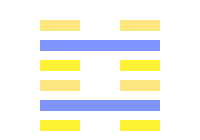
29.1.2.4.5 (29 > 51) - THE KHAN HEXAGRAM.
- 1. The first line, divided, shows its subject in the double defile, and (yet) entering a cavern within it. There will be evil.
- 2. The second line, undivided, shows its subject in all the peril of the defile. He will, however, get a little (of the deliverance) that he seeks.
- 4. The fourth line, divided, shows its subject (at a feast), with (simply) a bottle of spirits, and a subsidiary basket of rice, while (the cups and bowls) are (only) of earthenware. He introduces his important lessons (as his ruler's) intelligence admits. There will in the end be no error.
- 5. The fifth line, undivided, shows the water of the defile not yet full, (so that it might flow away) ; but order will (soon) be brought about. There will be no error.
29.1.2.4.5 (29 > 51) - Not wanting to serve
One is reluctant to make more efforts for others to benefit.
Bing DeepL Google Yandex29.1.2.4.5 (29 > 51) - Not wanting to serve
One is reluctant to make more efforts for others to benefit.
Bing DeepL Google Yandex29.1.2.4.5 (29 > 51) - K’ân, l’abîme
K’ān : danger, précipice, caverne. — Tsa k’ān : courir de grands risques ; s’exposer au danger pour un autre.
- 1. Courir des dangers, comme entrer dans une caverne d’un défilé dangereux, est chose redoutable.
-
2. Dans les écueils périlleux, si on sait modérer ses sentiments, on pourra en sortir heureusement.
Si on garde la modération. - 4. Si l’on offre des sacrifices avec simplicité (sans ostentation), avec un vase de spiritueux et une corbeille de grains, tandis que les assistants n’ont que des vases de terre, si par cette modération on se forme à la vertu, alors qu’on aurait d’abord des difficultés et des écueils, on deviendra irréprochable. (Moyen d’éviter les dangers.)
- 5. Mais si le danger n’est pas inéluctable, si une caverne où l’on se trouve n’est point pleine d’eau et qu’on puisse encore aplanir le terrain, on en sortira sans faute. — Il n’arrivera pas malheur.
29.1.2.4.5 (29 > 51) - Ne pas vouloir rendre service
On répugne à faire davantage d'efforts pour que les autres en profitent.
Bing DeepL Google Yandex29.1.2.4.5 (29 > 51) - Mélység
- 1. Ha egy nehézséggel találkozott, meg kell oldania mielőtt elkezdene foglalkozni egy másikkal.
- 2. Ha valaki túl nagy nehézségekkel kerül szembe, rá kell hagynia olyanokra akik tudják kezelni azokat.
- 4. Ha valaki eszközök híján van, meg kell elégednie egyszerű dolgokkal.
- 5. Mielőtt visszatérne hogy segítsen másokon, szünetet kell tartania és fel kell készülnie hogy válaszoljon a közelállóknak.

29.1.3.4.5 (29 > 34) - THE KHAN HEXAGRAM.
- 1. The first line, divided, shows its subject in the double defile, and (yet) entering a cavern within it. There will be evil.
- 3. The third line, divided, shows its subject, whether he comes or goes ( = descends or ascends), confronted by a defile. All is peril to him and unrest. (His endeavours) will lead him into the cavern of the pit. There should be no action (in such a case).
- 4. The fourth line, divided, shows its subject (at a feast), with (simply) a bottle of spirits, and a subsidiary basket of rice, while (the cups and bowls) are (only) of earthenware. He introduces his important lessons (as his ruler's) intelligence admits. There will in the end be no error.
- 5. The fifth line, undivided, shows the water of the defile not yet full, (so that it might flow away) ; but order will (soon) be brought about. There will be no error.
29.1.3.4.5 (29 > 34) - Being unable to prove one's innocence
One finds one's things where the others have gone.
Bing DeepL Google Yandex29.1.3.4.5 (29 > 34) - Being unable to prove one's innocence
One finds one's things where the others have gone.
Bing DeepL Google Yandex29.1.3.4.5 (29 > 34) - K’ân, l’abîme
K’ān : danger, précipice, caverne. — Tsa k’ān : courir de grands risques ; s’exposer au danger pour un autre.
- 1. Courir des dangers, comme entrer dans une caverne d’un défilé dangereux, est chose redoutable.
- 3. Si en tout et partout on ne rencontre que danger, que les périls, les sujets de crainte s’accumulent, alors dans un tel danger, il n’y a plus d’expédient qui puisse servir. — Il n’y aura plus de secours possible.
- 4. Si l’on offre des sacrifices avec simplicité (sans ostentation), avec un vase de spiritueux et une corbeille de grains, tandis que les assistants n’ont que des vases de terre, si par cette modération on se forme à la vertu, alors qu’on aurait d’abord des difficultés et des écueils, on deviendra irréprochable. (Moyen d’éviter les dangers.)
- 5. Mais si le danger n’est pas inéluctable, si une caverne où l’on se trouve n’est point pleine d’eau et qu’on puisse encore aplanir le terrain, on en sortira sans faute. — Il n’arrivera pas malheur.
29.1.3.4.5 (29 > 34) - Être incapable de prouver son innocence
On retrouve ses affaires là où les autres se sont rendus.
Bing DeepL Google Yandex29.1.3.4.5 (29 > 34) - Mélység
- 1. Ha egy nehézséggel találkozott, meg kell oldania mielőtt elkezdene foglalkozni egy másikkal.
- 3. Látják amit elrontott így odébbáll.
- 4. Ha valaki eszközök híján van, meg kell elégednie egyszerű dolgokkal.
- 5. Mielőtt visszatérne hogy segítsen másokon, szünetet kell tartania és fel kell készülnie hogy válaszoljon a közelállóknak.
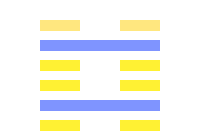
29.1.2.3.4.5 (29 > 55) - THE KHAN HEXAGRAM.
- 1. The first line, divided, shows its subject in the double defile, and (yet) entering a cavern within it. There will be evil.
- 2. The second line, undivided, shows its subject in all the peril of the defile. He will, however, get a little (of the deliverance) that he seeks.
- 3. The third line, divided, shows its subject, whether he comes or goes ( = descends or ascends), confronted by a defile. All is peril to him and unrest. (His endeavours) will lead him into the cavern of the pit. There should be no action (in such a case).
- 4. The fourth line, divided, shows its subject (at a feast), with (simply) a bottle of spirits, and a subsidiary basket of rice, while (the cups and bowls) are (only) of earthenware. He introduces his important lessons (as his ruler's) intelligence admits. There will in the end be no error.
- 5. The fifth line, undivided, shows the water of the defile not yet full, (so that it might flow away) ; but order will (soon) be brought about. There will be no error.
29.1.2.3.4.5 (29 > 55) - Spreading discomfort
One disturbs others by talking to them about disgusting things.
29.1.2.3.4.5 (29 > 55) - Spreading discomfort
One disturbs others by talking to them about disgusting things.
29.1.2.3.4.5 (29 > 55) - K’ân, l’abîme
K’ān : danger, précipice, caverne. — Tsa k’ān : courir de grands risques ; s’exposer au danger pour un autre.
- 1. Courir des dangers, comme entrer dans une caverne d’un défilé dangereux, est chose redoutable.
-
2. Dans les écueils périlleux, si on sait modérer ses sentiments, on pourra en sortir heureusement.
Si on garde la modération. - 3. Si en tout et partout on ne rencontre que danger, que les périls, les sujets de crainte s’accumulent, alors dans un tel danger, il n’y a plus d’expédient qui puisse servir. — Il n’y aura plus de secours possible.
- 4. Si l’on offre des sacrifices avec simplicité (sans ostentation), avec un vase de spiritueux et une corbeille de grains, tandis que les assistants n’ont que des vases de terre, si par cette modération on se forme à la vertu, alors qu’on aurait d’abord des difficultés et des écueils, on deviendra irréprochable. (Moyen d’éviter les dangers.)
- 5. Mais si le danger n’est pas inéluctable, si une caverne où l’on se trouve n’est point pleine d’eau et qu’on puisse encore aplanir le terrain, on en sortira sans faute. — Il n’arrivera pas malheur.
29.1.2.3.4.5 (29 > 55) - Répandre la gêne
On perturbe les autres en leur parlant de choses dégoûtantes.
Bing DeepL Google Yandex29.1.2.3.4.5 (29 > 55) - Mélység
- 1. Ha egy nehézséggel találkozott, meg kell oldania mielőtt elkezdene foglalkozni egy másikkal.
- 2. Ha valaki túl nagy nehézségekkel kerül szembe, rá kell hagynia olyanokra akik tudják kezelni azokat.
- 3. Látják amit elrontott így odébbáll.
- 4. Ha valaki eszközök híján van, meg kell elégednie egyszerű dolgokkal.
- 5. Mielőtt visszatérne hogy segítsen másokon, szünetet kell tartania és fel kell készülnie hogy válaszoljon a közelállóknak.
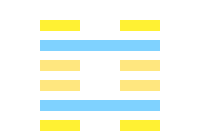
29.1.6 (29 > 61) - THE KHAN HEXAGRAM.
- 1. The first line, divided, shows its subject in the double defile, and (yet) entering a cavern within it. There will be evil.
- 6. The topmost line, divided, shows its subject bound with cords of three strands or two strands, and placed in the thicket of thorns. But in three years he does not learn the course for him to pursue. There will be evil.
29.1.6 (29 > 61) - Forcing oneself to smile
One stops making a bad face before the others leave.
Bing DeepL Google Yandex29.1.6 (29 > 61) - Forcing oneself to smile
One stops making a bad face before the others leave.
Bing DeepL Google Yandex29.1.6 (29 > 61) - K’ân, l’abîme
K’ān : danger, précipice, caverne. — Tsa k’ān : courir de grands risques ; s’exposer au danger pour un autre.
- 1. Courir des dangers, comme entrer dans une caverne d’un défilé dangereux, est chose redoutable.
- 6. Danger de celui qui, lié, vinculé de triples liens, enfermé dans un cachot, ne peut de longtemps parvenir à se délivrer. Sort funeste ! — Tel est celui qui a perdu la voie de la sagesse
29.1.6 (29 > 61) - Se forcer à sourire
On arrête de faire sa mauvaise tête avant que les autres ne partent.
Bing DeepL Google Yandex29.1.6 (29 > 61) - Mélység
- 1. Ha egy nehézséggel találkozott, meg kell oldania mielőtt elkezdene foglalkozni egy másikkal.
- 6. Ha túl fáradt, meg kell állnia és később folytatnia.

29.1.2.6 (29 > 42) - THE KHAN HEXAGRAM.
- 1. The first line, divided, shows its subject in the double defile, and (yet) entering a cavern within it. There will be evil.
- 2. The second line, undivided, shows its subject in all the peril of the defile. He will, however, get a little (of the deliverance) that he seeks.
- 6. The topmost line, divided, shows its subject bound with cords of three strands or two strands, and placed in the thicket of thorns. But in three years he does not learn the course for him to pursue. There will be evil.
29.1.2.6 (29 > 42) - Demanding the finest of work
One recruits assistants to do delicate work.
Bing DeepL Google Yandex29.1.2.6 (29 > 42) - Demanding the finest of work
One recruits assistants to do delicate work.
Bing DeepL Google Yandex29.1.2.6 (29 > 42) - K’ân, l’abîme
K’ān : danger, précipice, caverne. — Tsa k’ān : courir de grands risques ; s’exposer au danger pour un autre.
- 1. Courir des dangers, comme entrer dans une caverne d’un défilé dangereux, est chose redoutable.
-
2. Dans les écueils périlleux, si on sait modérer ses sentiments, on pourra en sortir heureusement.
Si on garde la modération. - 6. Danger de celui qui, lié, vinculé de triples liens, enfermé dans un cachot, ne peut de longtemps parvenir à se délivrer. Sort funeste ! — Tel est celui qui a perdu la voie de la sagesse
29.1.2.6 (29 > 42) - Réclamer un travail soigné
On recrute des assistants pour faire des travaux délicats.
Bing DeepL Google Yandex29.1.2.6 (29 > 42) - Mélység
- 1. Ha egy nehézséggel találkozott, meg kell oldania mielőtt elkezdene foglalkozni egy másikkal.
- 2. Ha valaki túl nagy nehézségekkel kerül szembe, rá kell hagynia olyanokra akik tudják kezelni azokat.
- 6. Ha túl fáradt, meg kell állnia és később folytatnia.
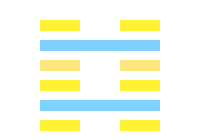
29.1.3.6 (29 > 9) - THE KHAN HEXAGRAM.
- 1. The first line, divided, shows its subject in the double defile, and (yet) entering a cavern within it. There will be evil.
- 3. The third line, divided, shows its subject, whether he comes or goes ( = descends or ascends), confronted by a defile. All is peril to him and unrest. (His endeavours) will lead him into the cavern of the pit. There should be no action (in such a case).
- 6. The topmost line, divided, shows its subject bound with cords of three strands or two strands, and placed in the thicket of thorns. But in three years he does not learn the course for him to pursue. There will be evil.
29.1.3.6 (29 > 9) - Sitting idle
One spends one's time looking at what's wrong instead of fixing it
Bing DeepL Google Yandex29.1.3.6 (29 > 9) - Sitting idle
One spends one's time looking at what's wrong instead of fixing it
Bing DeepL Google Yandex29.1.3.6 (29 > 9) - K’ân, l’abîme
K’ān : danger, précipice, caverne. — Tsa k’ān : courir de grands risques ; s’exposer au danger pour un autre.
- 1. Courir des dangers, comme entrer dans une caverne d’un défilé dangereux, est chose redoutable.
- 3. Si en tout et partout on ne rencontre que danger, que les périls, les sujets de crainte s’accumulent, alors dans un tel danger, il n’y a plus d’expédient qui puisse servir. — Il n’y aura plus de secours possible.
- 6. Danger de celui qui, lié, vinculé de triples liens, enfermé dans un cachot, ne peut de longtemps parvenir à se délivrer. Sort funeste ! — Tel est celui qui a perdu la voie de la sagesse
29.1.3.6 (29 > 9) - Rester les bras croisés
On passe son temps à regarder ce qui ne va pas au lieu d'y remédier.
Bing DeepL Google Yandex29.1.3.6 (29 > 9) - Mélység
- 1. Ha egy nehézséggel találkozott, meg kell oldania mielőtt elkezdene foglalkozni egy másikkal.
- 3. Látják amit elrontott így odébbáll.
- 6. Ha túl fáradt, meg kell állnia és később folytatnia.

29.1.2.3.6 (29 > 37) - THE KHAN HEXAGRAM.
- 1. The first line, divided, shows its subject in the double defile, and (yet) entering a cavern within it. There will be evil.
- 2. The second line, undivided, shows its subject in all the peril of the defile. He will, however, get a little (of the deliverance) that he seeks.
- 3. The third line, divided, shows its subject, whether he comes or goes ( = descends or ascends), confronted by a defile. All is peril to him and unrest. (His endeavours) will lead him into the cavern of the pit. There should be no action (in such a case).
- 6. The topmost line, divided, shows its subject bound with cords of three strands or two strands, and placed in the thicket of thorns. But in three years he does not learn the course for him to pursue. There will be evil.
29.1.2.3.6 (29 > 37) - Rallying those who have been deceived
One recruits allies from among those who have been betrayed.
Bing DeepL Google Yandex29.1.2.3.6 (29 > 37) - Rallying those who have been deceived
One recruits allies from among those who have been betrayed.
Bing DeepL Google Yandex29.1.2.3.6 (29 > 37) - K’ân, l’abîme
K’ān : danger, précipice, caverne. — Tsa k’ān : courir de grands risques ; s’exposer au danger pour un autre.
- 1. Courir des dangers, comme entrer dans une caverne d’un défilé dangereux, est chose redoutable.
-
2. Dans les écueils périlleux, si on sait modérer ses sentiments, on pourra en sortir heureusement.
Si on garde la modération. - 3. Si en tout et partout on ne rencontre que danger, que les périls, les sujets de crainte s’accumulent, alors dans un tel danger, il n’y a plus d’expédient qui puisse servir. — Il n’y aura plus de secours possible.
- 6. Danger de celui qui, lié, vinculé de triples liens, enfermé dans un cachot, ne peut de longtemps parvenir à se délivrer. Sort funeste ! — Tel est celui qui a perdu la voie de la sagesse
29.1.2.3.6 (29 > 37) - Rallier ceux qui ont été trompés
On recrute des alliés parmi ceux qui ont été trahis.
Bing DeepL Google Yandex29.1.2.3.6 (29 > 37) - Mélység
- 1. Ha egy nehézséggel találkozott, meg kell oldania mielőtt elkezdene foglalkozni egy másikkal.
- 2. Ha valaki túl nagy nehézségekkel kerül szembe, rá kell hagynia olyanokra akik tudják kezelni azokat.
- 3. Látják amit elrontott így odébbáll.
- 6. Ha túl fáradt, meg kell állnia és később folytatnia.
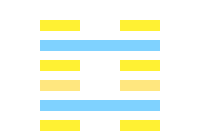
29.1.4.6 (29 > 10) - THE KHAN HEXAGRAM.
- 1. The first line, divided, shows its subject in the double defile, and (yet) entering a cavern within it. There will be evil.
- 4. The fourth line, divided, shows its subject (at a feast), with (simply) a bottle of spirits, and a subsidiary basket of rice, while (the cups and bowls) are (only) of earthenware. He introduces his important lessons (as his ruler's) intelligence admits. There will in the end be no error.
- 6. The topmost line, divided, shows its subject bound with cords of three strands or two strands, and placed in the thicket of thorns. But in three years he does not learn the course for him to pursue. There will be evil.
29.1.4.6 (29 > 10) - Not wanting any more scandal
One appreciates that others did not come to cause more trouble.
Bing DeepL Google Yandex29.1.4.6 (29 > 10) - Not wanting any more scandal
One appreciates that others did not come to cause more trouble.
Bing DeepL Google Yandex29.1.4.6 (29 > 10) - K’ân, l’abîme
K’ān : danger, précipice, caverne. — Tsa k’ān : courir de grands risques ; s’exposer au danger pour un autre.
- 1. Courir des dangers, comme entrer dans une caverne d’un défilé dangereux, est chose redoutable.
- 4. Si l’on offre des sacrifices avec simplicité (sans ostentation), avec un vase de spiritueux et une corbeille de grains, tandis que les assistants n’ont que des vases de terre, si par cette modération on se forme à la vertu, alors qu’on aurait d’abord des difficultés et des écueils, on deviendra irréprochable. (Moyen d’éviter les dangers.)
- 6. Danger de celui qui, lié, vinculé de triples liens, enfermé dans un cachot, ne peut de longtemps parvenir à se délivrer. Sort funeste ! — Tel est celui qui a perdu la voie de la sagesse
29.1.4.6 (29 > 10) - Ne plus vouloir scandales
On apprécie que les autres ne soient pas venus pour causer davantage de soucis.
Bing DeepL Google Yandex29.1.4.6 (29 > 10) - Mélység
- 1. Ha egy nehézséggel találkozott, meg kell oldania mielőtt elkezdene foglalkozni egy másikkal.
- 4. Ha valaki eszközök híján van, meg kell elégednie egyszerű dolgokkal.
- 6. Ha túl fáradt, meg kell állnia és később folytatnia.

29.1.2.4.6 (29 > 25) - THE KHAN HEXAGRAM.
- 1. The first line, divided, shows its subject in the double defile, and (yet) entering a cavern within it. There will be evil.
- 2. The second line, undivided, shows its subject in all the peril of the defile. He will, however, get a little (of the deliverance) that he seeks.
- 4. The fourth line, divided, shows its subject (at a feast), with (simply) a bottle of spirits, and a subsidiary basket of rice, while (the cups and bowls) are (only) of earthenware. He introduces his important lessons (as his ruler's) intelligence admits. There will in the end be no error.
- 6. The topmost line, divided, shows its subject bound with cords of three strands or two strands, and placed in the thicket of thorns. But in three years he does not learn the course for him to pursue. There will be evil.
29.1.2.4.6 (29 > 25) - Forcing sympathy
One compels one's friends by posing as a victim.
Bing DeepL Google Yandex29.1.2.4.6 (29 > 25) - Forcing sympathy
One compels one's friends by posing as a victim.
Bing DeepL Google Yandex29.1.2.4.6 (29 > 25) - K’ân, l’abîme
K’ān : danger, précipice, caverne. — Tsa k’ān : courir de grands risques ; s’exposer au danger pour un autre.
- 1. Courir des dangers, comme entrer dans une caverne d’un défilé dangereux, est chose redoutable.
-
2. Dans les écueils périlleux, si on sait modérer ses sentiments, on pourra en sortir heureusement.
Si on garde la modération. - 4. Si l’on offre des sacrifices avec simplicité (sans ostentation), avec un vase de spiritueux et une corbeille de grains, tandis que les assistants n’ont que des vases de terre, si par cette modération on se forme à la vertu, alors qu’on aurait d’abord des difficultés et des écueils, on deviendra irréprochable. (Moyen d’éviter les dangers.)
- 6. Danger de celui qui, lié, vinculé de triples liens, enfermé dans un cachot, ne peut de longtemps parvenir à se délivrer. Sort funeste ! — Tel est celui qui a perdu la voie de la sagesse
29.1.2.4.6 (29 > 25) - Forcer la sympathie
On oblige ses amis en se posant en victime.
Bing DeepL Google Yandex29.1.2.4.6 (29 > 25) - Mélység
- 1. Ha egy nehézséggel találkozott, meg kell oldania mielőtt elkezdene foglalkozni egy másikkal.
- 2. Ha valaki túl nagy nehézségekkel kerül szembe, rá kell hagynia olyanokra akik tudják kezelni azokat.
- 4. Ha valaki eszközök híján van, meg kell elégednie egyszerű dolgokkal.
- 6. Ha túl fáradt, meg kell állnia és később folytatnia.
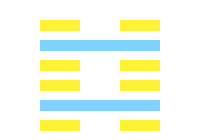
29.1.3.4.6 (29 > 1) - THE KHAN HEXAGRAM.
- 1. The first line, divided, shows its subject in the double defile, and (yet) entering a cavern within it. There will be evil.
- 3. The third line, divided, shows its subject, whether he comes or goes ( = descends or ascends), confronted by a defile. All is peril to him and unrest. (His endeavours) will lead him into the cavern of the pit. There should be no action (in such a case).
- 4. The fourth line, divided, shows its subject (at a feast), with (simply) a bottle of spirits, and a subsidiary basket of rice, while (the cups and bowls) are (only) of earthenware. He introduces his important lessons (as his ruler's) intelligence admits. There will in the end be no error.
- 6. The topmost line, divided, shows its subject bound with cords of three strands or two strands, and placed in the thicket of thorns. But in three years he does not learn the course for him to pursue. There will be evil.
29.1.3.4.6 (29 > 1) - Asking for everyone's approval
One thinks one can make one's choices accepted by others.
Bing DeepL Google Yandex29.1.3.4.6 (29 > 1) - Asking for everyone's approval
One thinks one can make one's choices accepted by others.
Bing DeepL Google Yandex29.1.3.4.6 (29 > 1) - K’ân, l’abîme
K’ān : danger, précipice, caverne. — Tsa k’ān : courir de grands risques ; s’exposer au danger pour un autre.
- 1. Courir des dangers, comme entrer dans une caverne d’un défilé dangereux, est chose redoutable.
- 3. Si en tout et partout on ne rencontre que danger, que les périls, les sujets de crainte s’accumulent, alors dans un tel danger, il n’y a plus d’expédient qui puisse servir. — Il n’y aura plus de secours possible.
- 4. Si l’on offre des sacrifices avec simplicité (sans ostentation), avec un vase de spiritueux et une corbeille de grains, tandis que les assistants n’ont que des vases de terre, si par cette modération on se forme à la vertu, alors qu’on aurait d’abord des difficultés et des écueils, on deviendra irréprochable. (Moyen d’éviter les dangers.)
- 6. Danger de celui qui, lié, vinculé de triples liens, enfermé dans un cachot, ne peut de longtemps parvenir à se délivrer. Sort funeste ! — Tel est celui qui a perdu la voie de la sagesse
29.1.3.4.6 (29 > 1) - Demander l'approbation de tous
On pense pouvoir faire accepter ses choix par les autres.
Bing DeepL Google Yandex29.1.3.4.6 (29 > 1) - Mélység
- 1. Ha egy nehézséggel találkozott, meg kell oldania mielőtt elkezdene foglalkozni egy másikkal.
- 3. Látják amit elrontott így odébbáll.
- 4. Ha valaki eszközök híján van, meg kell elégednie egyszerű dolgokkal.
- 6. Ha túl fáradt, meg kell állnia és később folytatnia.

29.1.2.3.4.6 (29 > 13) - THE KHAN HEXAGRAM.
- 1. The first line, divided, shows its subject in the double defile, and (yet) entering a cavern within it. There will be evil.
- 2. The second line, undivided, shows its subject in all the peril of the defile. He will, however, get a little (of the deliverance) that he seeks.
- 3. The third line, divided, shows its subject, whether he comes or goes ( = descends or ascends), confronted by a defile. All is peril to him and unrest. (His endeavours) will lead him into the cavern of the pit. There should be no action (in such a case).
- 4. The fourth line, divided, shows its subject (at a feast), with (simply) a bottle of spirits, and a subsidiary basket of rice, while (the cups and bowls) are (only) of earthenware. He introduces his important lessons (as his ruler's) intelligence admits. There will in the end be no error.
- 6. The topmost line, divided, shows its subject bound with cords of three strands or two strands, and placed in the thicket of thorns. But in three years he does not learn the course for him to pursue. There will be evil.
29.1.2.3.4.6 (29 > 13) - Venting off
One is aware of the need to tell others what is wrong.
Bing DeepL Google Yandex29.1.2.3.4.6 (29 > 13) - Venting off
One is aware of the need to tell others what is wrong.
Bing DeepL Google Yandex29.1.2.3.4.6 (29 > 13) - K’ân, l’abîme
K’ān : danger, précipice, caverne. — Tsa k’ān : courir de grands risques ; s’exposer au danger pour un autre.
- 1. Courir des dangers, comme entrer dans une caverne d’un défilé dangereux, est chose redoutable.
-
2. Dans les écueils périlleux, si on sait modérer ses sentiments, on pourra en sortir heureusement.
Si on garde la modération. - 3. Si en tout et partout on ne rencontre que danger, que les périls, les sujets de crainte s’accumulent, alors dans un tel danger, il n’y a plus d’expédient qui puisse servir. — Il n’y aura plus de secours possible.
- 4. Si l’on offre des sacrifices avec simplicité (sans ostentation), avec un vase de spiritueux et une corbeille de grains, tandis que les assistants n’ont que des vases de terre, si par cette modération on se forme à la vertu, alors qu’on aurait d’abord des difficultés et des écueils, on deviendra irréprochable. (Moyen d’éviter les dangers.)
- 6. Danger de celui qui, lié, vinculé de triples liens, enfermé dans un cachot, ne peut de longtemps parvenir à se délivrer. Sort funeste ! — Tel est celui qui a perdu la voie de la sagesse
29.1.2.3.4.6 (29 > 13) - Vider son sac
On est conscient de la nécessité de dire aux autres ce qui ne va pas.
Bing DeepL Google Yandex29.1.2.3.4.6 (29 > 13) - Mélység
- 1. Ha egy nehézséggel találkozott, meg kell oldania mielőtt elkezdene foglalkozni egy másikkal.
- 2. Ha valaki túl nagy nehézségekkel kerül szembe, rá kell hagynia olyanokra akik tudják kezelni azokat.
- 3. Látják amit elrontott így odébbáll.
- 4. Ha valaki eszközök híján van, meg kell elégednie egyszerű dolgokkal.
- 6. Ha túl fáradt, meg kell állnia és később folytatnia.

29.1.5.6 (29 > 41) - THE KHAN HEXAGRAM.
- 1. The first line, divided, shows its subject in the double defile, and (yet) entering a cavern within it. There will be evil.
- 5. The fifth line, undivided, shows the water of the defile not yet full, (so that it might flow away) ; but order will (soon) be brought about. There will be no error.
- 6. The topmost line, divided, shows its subject bound with cords of three strands or two strands, and placed in the thicket of thorns. But in three years he does not learn the course for him to pursue. There will be evil.
29.1.5.6 (29 > 41) - Entering convalescence
One gives back to those who deserve it the totality of their donation.
Bing DeepL Google Yandex29.1.5.6 (29 > 41) - Entering convalescence
One gives back to those who deserve it the totality of their donation.
Bing DeepL Google Yandex29.1.5.6 (29 > 41) - K’ân, l’abîme
K’ān : danger, précipice, caverne. — Tsa k’ān : courir de grands risques ; s’exposer au danger pour un autre.
- 1. Courir des dangers, comme entrer dans une caverne d’un défilé dangereux, est chose redoutable.
- 5. Mais si le danger n’est pas inéluctable, si une caverne où l’on se trouve n’est point pleine d’eau et qu’on puisse encore aplanir le terrain, on en sortira sans faute. — Il n’arrivera pas malheur.
- 6. Danger de celui qui, lié, vinculé de triples liens, enfermé dans un cachot, ne peut de longtemps parvenir à se délivrer. Sort funeste ! — Tel est celui qui a perdu la voie de la sagesse
29.1.5.6 (29 > 41) - Entrer en convalescence
On restitue à ceux qui le méritent la totalité de leur don.
Bing DeepL Google Yandex29.1.5.6 (29 > 41) - Mélység
- 1. Ha egy nehézséggel találkozott, meg kell oldania mielőtt elkezdene foglalkozni egy másikkal.
- 5. Mielőtt visszatérne hogy segítsen másokon, szünetet kell tartania és fel kell készülnie hogy válaszoljon a közelállóknak.
- 6. Ha túl fáradt, meg kell állnia és később folytatnia.
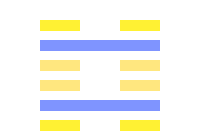
29.1.2.5.6 (29 > 27) - THE KHAN HEXAGRAM.
- 1. The first line, divided, shows its subject in the double defile, and (yet) entering a cavern within it. There will be evil.
- 2. The second line, undivided, shows its subject in all the peril of the defile. He will, however, get a little (of the deliverance) that he seeks.
- 5. The fifth line, undivided, shows the water of the defile not yet full, (so that it might flow away) ; but order will (soon) be brought about. There will be no error.
- 6. The topmost line, divided, shows its subject bound with cords of three strands or two strands, and placed in the thicket of thorns. But in three years he does not learn the course for him to pursue. There will be evil.
29.1.2.5.6 (29 > 27) - Getting a taste for what one is doing
One contributes to the well-being of all by taking appropriate measures.
Bing DeepL Google Yandex29.1.2.5.6 (29 > 27) - Getting a taste for what one is doing
One contributes to the well-being of all by taking appropriate measures.
Bing DeepL Google Yandex29.1.2.5.6 (29 > 27) - K’ân, l’abîme
K’ān : danger, précipice, caverne. — Tsa k’ān : courir de grands risques ; s’exposer au danger pour un autre.
- 1. Courir des dangers, comme entrer dans une caverne d’un défilé dangereux, est chose redoutable.
-
2. Dans les écueils périlleux, si on sait modérer ses sentiments, on pourra en sortir heureusement.
Si on garde la modération. - 5. Mais si le danger n’est pas inéluctable, si une caverne où l’on se trouve n’est point pleine d’eau et qu’on puisse encore aplanir le terrain, on en sortira sans faute. — Il n’arrivera pas malheur.
- 6. Danger de celui qui, lié, vinculé de triples liens, enfermé dans un cachot, ne peut de longtemps parvenir à se délivrer. Sort funeste ! — Tel est celui qui a perdu la voie de la sagesse
29.1.2.5.6 (29 > 27) - Prendre goût à ce qu'on fait
On contribue au bien-être de tous en prenant des mesures adéquates.
Bing DeepL Google Yandex29.1.2.5.6 (29 > 27) - Mélység
- 1. Ha egy nehézséggel találkozott, meg kell oldania mielőtt elkezdene foglalkozni egy másikkal.
- 2. Ha valaki túl nagy nehézségekkel kerül szembe, rá kell hagynia olyanokra akik tudják kezelni azokat.
- 5. Mielőtt visszatérne hogy segítsen másokon, szünetet kell tartania és fel kell készülnie hogy válaszoljon a közelállóknak.
- 6. Ha túl fáradt, meg kell állnia és később folytatnia.

29.1.3.5.6 (29 > 26) - THE KHAN HEXAGRAM.
- 1. The first line, divided, shows its subject in the double defile, and (yet) entering a cavern within it. There will be evil.
- 3. The third line, divided, shows its subject, whether he comes or goes ( = descends or ascends), confronted by a defile. All is peril to him and unrest. (His endeavours) will lead him into the cavern of the pit. There should be no action (in such a case).
- 5. The fifth line, undivided, shows the water of the defile not yet full, (so that it might flow away) ; but order will (soon) be brought about. There will be no error.
- 6. The topmost line, divided, shows its subject bound with cords of three strands or two strands, and placed in the thicket of thorns. But in three years he does not learn the course for him to pursue. There will be evil.
29.1.3.5.6 (29 > 26) - Righteous impatience
One recriminates against those who have taken too long to do their job.
Bing DeepL Google Yandex29.1.3.5.6 (29 > 26) - Righteous impatience
One recriminates against those who have taken too long to do their job.
Bing DeepL Google Yandex29.1.3.5.6 (29 > 26) - K’ân, l’abîme
K’ān : danger, précipice, caverne. — Tsa k’ān : courir de grands risques ; s’exposer au danger pour un autre.
- 1. Courir des dangers, comme entrer dans une caverne d’un défilé dangereux, est chose redoutable.
- 3. Si en tout et partout on ne rencontre que danger, que les périls, les sujets de crainte s’accumulent, alors dans un tel danger, il n’y a plus d’expédient qui puisse servir. — Il n’y aura plus de secours possible.
- 5. Mais si le danger n’est pas inéluctable, si une caverne où l’on se trouve n’est point pleine d’eau et qu’on puisse encore aplanir le terrain, on en sortira sans faute. — Il n’arrivera pas malheur.
- 6. Danger de celui qui, lié, vinculé de triples liens, enfermé dans un cachot, ne peut de longtemps parvenir à se délivrer. Sort funeste ! — Tel est celui qui a perdu la voie de la sagesse
29.1.3.5.6 (29 > 26) - Juste impatience
On récrimine contre ceux qui ont pris trop de temps pour accomplir leur travail.
Bing DeepL Google Yandex29.1.3.5.6 (29 > 26) - Mélység
- 1. Ha egy nehézséggel találkozott, meg kell oldania mielőtt elkezdene foglalkozni egy másikkal.
- 3. Látják amit elrontott így odébbáll.
- 5. Mielőtt visszatérne hogy segítsen másokon, szünetet kell tartania és fel kell készülnie hogy válaszoljon a közelállóknak.
- 6. Ha túl fáradt, meg kell állnia és később folytatnia.
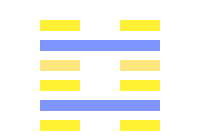
29.1.2.3.5.6 (29 > 22) - THE KHAN HEXAGRAM.
- 1. The first line, divided, shows its subject in the double defile, and (yet) entering a cavern within it. There will be evil.
- 2. The second line, undivided, shows its subject in all the peril of the defile. He will, however, get a little (of the deliverance) that he seeks.
- 3. The third line, divided, shows its subject, whether he comes or goes ( = descends or ascends), confronted by a defile. All is peril to him and unrest. (His endeavours) will lead him into the cavern of the pit. There should be no action (in such a case).
- 5. The fifth line, undivided, shows the water of the defile not yet full, (so that it might flow away) ; but order will (soon) be brought about. There will be no error.
- 6. The topmost line, divided, shows its subject bound with cords of three strands or two strands, and placed in the thicket of thorns. But in three years he does not learn the course for him to pursue. There will be evil.
29.1.2.3.5.6 (29 > 22) - Finding an explanation
One puts into context an event that others cannot understand.
Bing DeepL Google Yandex29.1.2.3.5.6 (29 > 22) - Finding an explanation
One puts into context an event that others cannot understand.
Bing DeepL Google Yandex29.1.2.3.5.6 (29 > 22) - K’ân, l’abîme
K’ān : danger, précipice, caverne. — Tsa k’ān : courir de grands risques ; s’exposer au danger pour un autre.
- 1. Courir des dangers, comme entrer dans une caverne d’un défilé dangereux, est chose redoutable.
-
2. Dans les écueils périlleux, si on sait modérer ses sentiments, on pourra en sortir heureusement.
Si on garde la modération. - 3. Si en tout et partout on ne rencontre que danger, que les périls, les sujets de crainte s’accumulent, alors dans un tel danger, il n’y a plus d’expédient qui puisse servir. — Il n’y aura plus de secours possible.
- 5. Mais si le danger n’est pas inéluctable, si une caverne où l’on se trouve n’est point pleine d’eau et qu’on puisse encore aplanir le terrain, on en sortira sans faute. — Il n’arrivera pas malheur.
- 6. Danger de celui qui, lié, vinculé de triples liens, enfermé dans un cachot, ne peut de longtemps parvenir à se délivrer. Sort funeste ! — Tel est celui qui a perdu la voie de la sagesse
29.1.2.3.5.6 (29 > 22) - Trouver une explication
On replace dans son contexte un événement que les autres n'arrivent pas à comprendre.
Bing DeepL Google Yandex29.1.2.3.5.6 (29 > 22) - Mélység
- 1. Ha egy nehézséggel találkozott, meg kell oldania mielőtt elkezdene foglalkozni egy másikkal.
- 2. Ha valaki túl nagy nehézségekkel kerül szembe, rá kell hagynia olyanokra akik tudják kezelni azokat.
- 3. Látják amit elrontott így odébbáll.
- 5. Mielőtt visszatérne hogy segítsen másokon, szünetet kell tartania és fel kell készülnie hogy válaszoljon a közelállóknak.
- 6. Ha túl fáradt, meg kell állnia és később folytatnia.

29.1.4.5.6 (29 > 38) - THE KHAN HEXAGRAM.
- 1. The first line, divided, shows its subject in the double defile, and (yet) entering a cavern within it. There will be evil.
- 4. The fourth line, divided, shows its subject (at a feast), with (simply) a bottle of spirits, and a subsidiary basket of rice, while (the cups and bowls) are (only) of earthenware. He introduces his important lessons (as his ruler's) intelligence admits. There will in the end be no error.
- 5. The fifth line, undivided, shows the water of the defile not yet full, (so that it might flow away) ; but order will (soon) be brought about. There will be no error.
- 6. The topmost line, divided, shows its subject bound with cords of three strands or two strands, and placed in the thicket of thorns. But in three years he does not learn the course for him to pursue. There will be evil.
29.1.4.5.6 (29 > 38) - Being observant
One becomes less likely to make mistakes when one has received the corresponding training.
Bing DeepL Google Yandex29.1.4.5.6 (29 > 38) - Being observant
One becomes less likely to make mistakes when one has received the corresponding training.
Bing DeepL Google Yandex29.1.4.5.6 (29 > 38) - K’ân, l’abîme
K’ān : danger, précipice, caverne. — Tsa k’ān : courir de grands risques ; s’exposer au danger pour un autre.
- 1. Courir des dangers, comme entrer dans une caverne d’un défilé dangereux, est chose redoutable.
- 4. Si l’on offre des sacrifices avec simplicité (sans ostentation), avec un vase de spiritueux et une corbeille de grains, tandis que les assistants n’ont que des vases de terre, si par cette modération on se forme à la vertu, alors qu’on aurait d’abord des difficultés et des écueils, on deviendra irréprochable. (Moyen d’éviter les dangers.)
- 5. Mais si le danger n’est pas inéluctable, si une caverne où l’on se trouve n’est point pleine d’eau et qu’on puisse encore aplanir le terrain, on en sortira sans faute. — Il n’arrivera pas malheur.
- 6. Danger de celui qui, lié, vinculé de triples liens, enfermé dans un cachot, ne peut de longtemps parvenir à se délivrer. Sort funeste ! — Tel est celui qui a perdu la voie de la sagesse
29.1.4.5.6 (29 > 38) - Être regardant
On devient moins susceptible de faire des erreurs quand on a reçu la formation correspondante.
Bing DeepL Google Yandex29.1.4.5.6 (29 > 38) - Mélység
- 1. Ha egy nehézséggel találkozott, meg kell oldania mielőtt elkezdene foglalkozni egy másikkal.
- 4. Ha valaki eszközök híján van, meg kell elégednie egyszerű dolgokkal.
- 5. Mielőtt visszatérne hogy segítsen másokon, szünetet kell tartania és fel kell készülnie hogy válaszoljon a közelállóknak.
- 6. Ha túl fáradt, meg kell állnia és később folytatnia.
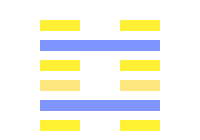
29.1.2.4.5.6 (29 > 21) - THE KHAN HEXAGRAM.
- 1. The first line, divided, shows its subject in the double defile, and (yet) entering a cavern within it. There will be evil.
- 2. The second line, undivided, shows its subject in all the peril of the defile. He will, however, get a little (of the deliverance) that he seeks.
- 4. The fourth line, divided, shows its subject (at a feast), with (simply) a bottle of spirits, and a subsidiary basket of rice, while (the cups and bowls) are (only) of earthenware. He introduces his important lessons (as his ruler's) intelligence admits. There will in the end be no error.
- 5. The fifth line, undivided, shows the water of the defile not yet full, (so that it might flow away) ; but order will (soon) be brought about. There will be no error.
- 6. The topmost line, divided, shows its subject bound with cords of three strands or two strands, and placed in the thicket of thorns. But in three years he does not learn the course for him to pursue. There will be evil.
29.1.2.4.5.6 (29 > 21) - Wanting more and more
One is asking even more of those who have already given everything.
Bing DeepL Google Yandex29.1.2.4.5.6 (29 > 21) - Wanting more and more
One is asking even more of those who have already given everything.
Bing DeepL Google Yandex29.1.2.4.5.6 (29 > 21) - K’ân, l’abîme
K’ān : danger, précipice, caverne. — Tsa k’ān : courir de grands risques ; s’exposer au danger pour un autre.
- 1. Courir des dangers, comme entrer dans une caverne d’un défilé dangereux, est chose redoutable.
-
2. Dans les écueils périlleux, si on sait modérer ses sentiments, on pourra en sortir heureusement.
Si on garde la modération. - 4. Si l’on offre des sacrifices avec simplicité (sans ostentation), avec un vase de spiritueux et une corbeille de grains, tandis que les assistants n’ont que des vases de terre, si par cette modération on se forme à la vertu, alors qu’on aurait d’abord des difficultés et des écueils, on deviendra irréprochable. (Moyen d’éviter les dangers.)
- 5. Mais si le danger n’est pas inéluctable, si une caverne où l’on se trouve n’est point pleine d’eau et qu’on puisse encore aplanir le terrain, on en sortira sans faute. — Il n’arrivera pas malheur.
- 6. Danger de celui qui, lié, vinculé de triples liens, enfermé dans un cachot, ne peut de longtemps parvenir à se délivrer. Sort funeste ! — Tel est celui qui a perdu la voie de la sagesse
29.1.2.4.5.6 (29 > 21) - Vouloir toujours plus
On réclame encore davantage à ceux qui ont déjà tout donné.
Bing DeepL Google Yandex29.1.2.4.5.6 (29 > 21) - Mélység
- 1. Ha egy nehézséggel találkozott, meg kell oldania mielőtt elkezdene foglalkozni egy másikkal.
- 2. Ha valaki túl nagy nehézségekkel kerül szembe, rá kell hagynia olyanokra akik tudják kezelni azokat.
- 4. Ha valaki eszközök híján van, meg kell elégednie egyszerű dolgokkal.
- 5. Mielőtt visszatérne hogy segítsen másokon, szünetet kell tartania és fel kell készülnie hogy válaszoljon a közelállóknak.
- 6. Ha túl fáradt, meg kell állnia és később folytatnia.

29.1.3.4.5.6 (29 > 14) - THE KHAN HEXAGRAM.
- 1. The first line, divided, shows its subject in the double defile, and (yet) entering a cavern within it. There will be evil.
- 3. The third line, divided, shows its subject, whether he comes or goes ( = descends or ascends), confronted by a defile. All is peril to him and unrest. (His endeavours) will lead him into the cavern of the pit. There should be no action (in such a case).
- 4. The fourth line, divided, shows its subject (at a feast), with (simply) a bottle of spirits, and a subsidiary basket of rice, while (the cups and bowls) are (only) of earthenware. He introduces his important lessons (as his ruler's) intelligence admits. There will in the end be no error.
- 5. The fifth line, undivided, shows the water of the defile not yet full, (so that it might flow away) ; but order will (soon) be brought about. There will be no error.
- 6. The topmost line, divided, shows its subject bound with cords of three strands or two strands, and placed in the thicket of thorns. But in three years he does not learn the course for him to pursue. There will be evil.
29.1.3.4.5.6 (29 > 14) - Lacking of thinking
One thinks being right against all common sense.
Bing DeepL Google Yandex29.1.3.4.5.6 (29 > 14) - Lacking of thinking
One thinks being right against all common sense.
Bing DeepL Google Yandex29.1.3.4.5.6 (29 > 14) - K’ân, l’abîme
K’ān : danger, précipice, caverne. — Tsa k’ān : courir de grands risques ; s’exposer au danger pour un autre.
- 1. Courir des dangers, comme entrer dans une caverne d’un défilé dangereux, est chose redoutable.
- 3. Si en tout et partout on ne rencontre que danger, que les périls, les sujets de crainte s’accumulent, alors dans un tel danger, il n’y a plus d’expédient qui puisse servir. — Il n’y aura plus de secours possible.
- 4. Si l’on offre des sacrifices avec simplicité (sans ostentation), avec un vase de spiritueux et une corbeille de grains, tandis que les assistants n’ont que des vases de terre, si par cette modération on se forme à la vertu, alors qu’on aurait d’abord des difficultés et des écueils, on deviendra irréprochable. (Moyen d’éviter les dangers.)
- 5. Mais si le danger n’est pas inéluctable, si une caverne où l’on se trouve n’est point pleine d’eau et qu’on puisse encore aplanir le terrain, on en sortira sans faute. — Il n’arrivera pas malheur.
- 6. Danger de celui qui, lié, vinculé de triples liens, enfermé dans un cachot, ne peut de longtemps parvenir à se délivrer. Sort funeste ! — Tel est celui qui a perdu la voie de la sagesse
29.1.3.4.5.6 (29 > 14) - Manquer de réflexion
On pense avoir raison en dépit du bon sens.
Bing DeepL Google Yandex29.1.3.4.5.6 (29 > 14) - Mélység
- 1. Ha egy nehézséggel találkozott, meg kell oldania mielőtt elkezdene foglalkozni egy másikkal.
- 3. Látják amit elrontott így odébbáll.
- 4. Ha valaki eszközök híján van, meg kell elégednie egyszerű dolgokkal.
- 5. Mielőtt visszatérne hogy segítsen másokon, szünetet kell tartania és fel kell készülnie hogy válaszoljon a közelállóknak.
- 6. Ha túl fáradt, meg kell állnia és később folytatnia.
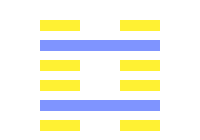
29.1.2.3.4.5.6 (29 > 30) - THE KHAN HEXAGRAM.
- 1. The first line, divided, shows its subject in the double defile, and (yet) entering a cavern within it. There will be evil.
- 2. The second line, undivided, shows its subject in all the peril of the defile. He will, however, get a little (of the deliverance) that he seeks.
- 3. The third line, divided, shows its subject, whether he comes or goes ( = descends or ascends), confronted by a defile. All is peril to him and unrest. (His endeavours) will lead him into the cavern of the pit. There should be no action (in such a case).
- 4. The fourth line, divided, shows its subject (at a feast), with (simply) a bottle of spirits, and a subsidiary basket of rice, while (the cups and bowls) are (only) of earthenware. He introduces his important lessons (as his ruler's) intelligence admits. There will in the end be no error.
- 5. The fifth line, undivided, shows the water of the defile not yet full, (so that it might flow away) ; but order will (soon) be brought about. There will be no error.
- 6. The topmost line, divided, shows its subject bound with cords of three strands or two strands, and placed in the thicket of thorns. But in three years he does not learn the course for him to pursue. There will be evil.
29.1.2.3.4.5.6 (29 > 30) - Not risking more
One lacks courage to dare tempting the devil once again.
Bing DeepL Google Yandex29.1.2.3.4.5.6 (29 > 30) - Not risking more
One lacks courage to dare tempting the devil once again.
Bing DeepL Google Yandex29.1.2.3.4.5.6 (29 > 30) - K’ân, l’abîme
K’ān : danger, précipice, caverne. — Tsa k’ān : courir de grands risques ; s’exposer au danger pour un autre.
- 1. Courir des dangers, comme entrer dans une caverne d’un défilé dangereux, est chose redoutable.
-
2. Dans les écueils périlleux, si on sait modérer ses sentiments, on pourra en sortir heureusement.
Si on garde la modération. - 3. Si en tout et partout on ne rencontre que danger, que les périls, les sujets de crainte s’accumulent, alors dans un tel danger, il n’y a plus d’expédient qui puisse servir. — Il n’y aura plus de secours possible.
- 4. Si l’on offre des sacrifices avec simplicité (sans ostentation), avec un vase de spiritueux et une corbeille de grains, tandis que les assistants n’ont que des vases de terre, si par cette modération on se forme à la vertu, alors qu’on aurait d’abord des difficultés et des écueils, on deviendra irréprochable. (Moyen d’éviter les dangers.)
- 5. Mais si le danger n’est pas inéluctable, si une caverne où l’on se trouve n’est point pleine d’eau et qu’on puisse encore aplanir le terrain, on en sortira sans faute. — Il n’arrivera pas malheur.
- 6. Danger de celui qui, lié, vinculé de triples liens, enfermé dans un cachot, ne peut de longtemps parvenir à se délivrer. Sort funeste ! — Tel est celui qui a perdu la voie de la sagesse
29.1.2.3.4.5.6 (29 > 30) - Ne pas risquer plus
On manque de courage pour oser tenter le diable encore une fois.
Bing DeepL Google Yandex29.1.2.3.4.5.6 (29 > 30) - Mélység
- 1. Ha egy nehézséggel találkozott, meg kell oldania mielőtt elkezdene foglalkozni egy másikkal.
- 2. Ha valaki túl nagy nehézségekkel kerül szembe, rá kell hagynia olyanokra akik tudják kezelni azokat.
- 3. Látják amit elrontott így odébbáll.
- 4. Ha valaki eszközök híján van, meg kell elégednie egyszerű dolgokkal.
- 5. Mielőtt visszatérne hogy segítsen másokon, szünetet kell tartania és fel kell készülnie hogy válaszoljon a közelállóknak.
- 6. Ha túl fáradt, meg kell állnia és később folytatnia.

